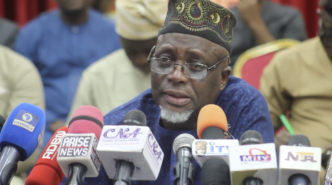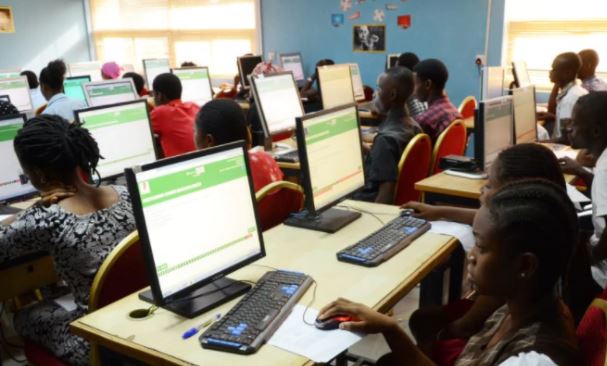A JAMB CBT centre in Lagos
The Joint Admissions and Matriculation Board (JAMB) has once again found itself at the centre of a national scandal following the disastrous conduct of the 2025 Unified Tertiary Matriculation Examination (UTME). What began as a technical glitch has spiralled into a crisis of accountability, ethnic distrust, and tragic consequences, raising urgent questions about Nigeria’s education system, governance, and the culture of impunity that shields public officials from repercussions.
A cover-up in plain sight
Professor Ishaq Oloyede, the registrar of JAMB, acknowledged that 379,997 candidates, with a disproportionately high number from Lagos (206,610) and the Southeast (173,387), would be compelled to retake the Unified Tertiary Matriculation Examination. This decision, he stated, was due to a “combination of human error and technology.” However, the actual situation was far more severe than this explanation suggested.
A subsequent high-level technical review uncovered several critical issues: a vital software patch, essential for accurate grading, had been implemented in the Kaduna (KAD) zone, but crucially, not in the Lagos (LAG) zone, which also served examination centres in the Southeast. Consequently, 157 centres, comprising 92 in the Southeast and 65 in Lagos, operated using a flawed system logic, which led to severely compromised examination results. Disturbingly, it was revealed that JAMB had become aware of this error after 17 examination sessions had already taken place. Yet, they proceeded to rectify the problem discreetly, without informing the affected candidates. The board then compounded this issue by releasing the flawed results, effectively labelling thousands of students as failures, and only admitted their culpability 19 days later, following significant public outcry.
Advertisement
The human cost of impunity
In any functional society, a colossal failure of this nature would typically prompt immediate resignations or dismissals of those in charge. Yet, in this instance, no official has faced any consequences for the debacle. Professor Oloyede has remained in his position, offering what are widely perceived as insincere apologies. Meanwhile, the Minister of Education initially dismissed the numerous complaints, falsely asserting that the mass failures were actually evidence of the effectiveness of the “anti-malware systems”. Only after the threat of lawsuits and significant public fury was JAMB forced to backtrack, revealing a deeply flawed system that appears to punish the victims of its incompetence while shielding the officials responsible. The message sent by this lack of accountability is unequivocal: Nigeria’s elite operate with a sense of impunity, seemingly protected from any repercussions, even when their actions have devastating consequences.
The human cost of this scandal has been utterly devastating. At least one student, driven to despair after being labelled a failure, tragically committed suicide. Several others have gone missing, leaving their families to endure unimaginable anguish. Thousands more have been profoundly traumatised, subjected to public ridicule and forced to live with debilitating uncertainty about their futures. These were not mere statistics or abstract figures; they were children, young people whose dreams and aspirations were gambled away by bureaucratic ineptitude.
Advertisement
Why the Igbo have every right to be paranoid
The geographical distribution of the error, disproportionately affecting Lagos and the Southeast, has ignited deep-seated suspicions. It’s important to note that Lagos has a substantial Igbo population, and claims are circulating that the most heavily impacted areas within Lagos are predominantly Igbo-dominated. This context is crucial because, given Nigeria’s history, the Igbo people’s mistrust is not simply a matter of paranoia; it represents a rational response rooted in experiences of systemic marginalisation.
Nigeria’s quota system has historically disadvantaged the Igbo people. This policy often prioritises regional representation over individual merit in educational institutions and federal appointments. The deep wounds inflicted by the brutal repression of the Biafran War and the subsequent decades of political exclusion have left enduring scars on the collective psyche of the Igbo community. These historical injustices, coupled with past JAMB controversies, including allegations of deliberate score suppression, have cultivated an environment where fears of targeted sabotage are easily reinforced.
Several pertinent questions arise from this latest scandal. Why was the critical software patch deployed in Kaduna but not in the South, where a significant portion of the affected candidates reside? Why did the error disproportionately impact Igbo students, who consistently demonstrate high academic performance? In a country where ethnic tensions constantly simmer just beneath the surface, such “coincidences” are inevitably viewed with a high degree of suspicion.
Advertisement
It is worth observing that the level of paranoia surrounding such incidents might not have been as pronounced prior to 2015. This observation speaks to the perceived mishandling of Nigeria’s ethnic diversity in more recent years.
The silence of the authorities
What is particularly egregious is the prolonged silence that followed the discovery of this critical error. Despite identifying the issue after seventeen sessions, the authorities at JAMB chose a path of quiet rectification, neglecting to inform the very candidates whose futures hung in the balance. This silence persisted as flawed results were released, branding a significant portion of these students as failures. It was only the swelling tide of public outrage, the palpable distress of parents and candidates, and the looming threat of legal action that finally compelled an admission of guilt – a full 19 days after the error was reportedly known.
This protracted silence speaks volumes. It suggests a deeply ingrained culture of opacity, a reluctance to be forthright with the public, and a potential disregard for the immense emotional and psychological toll inflicted on the affected students. The initial muted response, followed by a belated and seemingly reluctant acknowledgement, only served to amplify the existing anxieties, particularly within the Southeast. For a region already sensitive to historical marginalisation and perceived systemic bias, this extended period of official silence, coupled with the disproportionate impact of the error, understandably breeds deep suspicion. The question of whether this was mere incompetence or something more insidious inevitably arises in the absence of prompt and transparent communication. This silence, this void of accountability in the immediate aftermath, has not only eroded trust in a vital public institution but has also allowed ethnic tensions to fester, reinforcing the painful narratives of past injustices. The authorities’ delayed response has amplified the sense of impunity, suggesting that those in positions of power can err catastrophically and remain shielded from immediate scrutiny and consequence.
Advertisement
What must be done?
The 2025 JAMB scandal transcends a mere administrative blunder. It is a stark indicator of Nigeria’s deeper systemic issues: a pervasive lack of accountability in public office, a demonstrable disregard for the well-being of its citizens, and the dangerous exacerbation of existing ethnic tensions through systemic failures. Until those responsible face tangible consequences, until genuine transparency replaces the instinct for cover-ups, and until a system based on meritocracy supplants discriminatory quota systems, the country will remain vulnerable to the recurrence of such damaging events. The Igbo people, alongside all Nigerians, deserve a system built on fairness and integrity. However, as long as impunity reigns supreme, distrust will continue to fester, and the potential for further tragedies that erode national unity will persist.
Advertisement
To restore the deeply fractured trust, Nigeria must undertake decisive action. This includes immediately initiating an independent and thorough investigation into JAMB’s handling of the 2025 UTME. Furthermore, it is imperative that sanctions are levied against all officials found responsible for both the initial error and any subsequent attempts at concealment. Affected candidates must receive comprehensive compensation, including provisions for mental health support to address the significant trauma they have endured. Crucially, systemic reforms, such as the implementation of real-time monitoring and transparent operational protocols, are essential to prevent future failures of this magnitude. Nigeria’s education system, a cornerstone of its future, cannot withstand another scandal of this scale. The moment for accountability is not in the future; it is now.
Nwanze is a partner at SBM Intelligence
Advertisement
Views expressed by contributors are strictly personal and not of TheCable.










